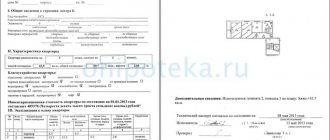What is social hiring
To understand what social renting (hereinafter referred to as SN) of an apartment or any other residential premises is, it is enough to remember the features of renting real estate. In essence, the relationships that arise when concluding a lease and social rent are almost identical. One entity transfers property for use to another for a certain period of time for a specified fee.
But at the same time, SN agreements differ in a number of features:
- subject composition - one party is necessarily a municipality or the state represented by authorized bodies, the other is an individual;
- subject - exclusively residential real estate;
- reduced monthly payment rates compared to market rental prices;
- special requirements established for candidates for social housing.
Important. According to paragraph 2 of Art. 60 LC agreement SN is concluded without establishing a validity period.
Legal definition of what social rent is
Step-by-step procedure for obtaining: where and in what sequence to apply
The provision of social housing is an administrative procedure. So, in a procedural sense, applicants for it need to perform the following actions:
- apply with the whole family to the local social service department to determine the status of a low-income family;
- contact the housing organization or passport office to obtain information about the residents of the current housing;
- Contact the multifunctional office to register.
After this, you will have to wait your turn and prepare for paperwork as you go.
Documents you will need
In order to get on the waiting list for subsidized housing, you must prepare the following list of documents:
- certificate stating that the family is low-income;
- certificate about the residents of the current living space;
- a document certifying the applicant’s preferential status;
- application for registration to improve living conditions.
When the turn comes, it will be necessary to re-collect the specified documents that will be necessary to conclude the relevant agreement.
Requirements for accommodation
Housing legislation establishes that for each tenant in a house or apartment there must be:
- at least 12 square meters if the dwelling is occupied by one family;
- at least 15 square meters if the housing is communal and more than one family lives there.
Although the Housing Code establishes that there are 18 or more square meters per tenant in an apartment or house, the state program and, in particular, the Moscow authorities are not able to provide this criterion. For this reason, at the regional level, such requirements are underestimated.
Who is entitled to housing under a social tenancy agreement?
As a general rule, social housing is available exclusively to citizens of the Russian Federation. Foreigners or stateless persons do not have the right to apply for state housing, unless otherwise established by international agreements between Russia and another country.
Registered entities can apply for the allocation of municipal housing:
- those in need of improved housing conditions (until 03/01/2005);
- those in need of residential premises (after 01.03.2005).
Apartments are allocated on a first-come, first-served basis—each applicant is assigned a number. But sometimes the legislator provides additional benefits or benefits for certain categories of the population.
Extraordinary
Providing housing outside the general queue is possible in several cases. However, you should not expect that such an extraordinary person will be immediately offered a free object. As a rule, a separate queue is formed from those outside the queue.
The number of beneficiaries includes persons:
- living in unsuitable, unsafe or non-compliant premises;
- children whose parents died or were deprived of parental authority;
- occupying housing together with seriously ill relatives, when the specific nature of the disease makes it impossible to live together in comfort and safety.
Important. The list of diseases, the diagnosis of which allows us to raise the issue of the need to obtain additional square meters, is established by Order of the Ministry of Health No. 987n dated November 29, 2012.

Categories of citizens entitled to social rent of housing out of turn
Military
As a rule, persons performing official duties in the branches of the armed forces or law enforcement agencies can apply for official or departmental living space. Such premises belong to the property of a specific ministry or department. The apartment is allowed to be occupied during the period of service or performance of professional duties. In some cases, such housing can even be privatized.
Poor
A person is recognized as a low-income person by a local government body. In this case, the level of income and property status of the applicant for such status must be taken into account. Each region has its own standard for assigning the title of low-income people.
Low-income people in need of improved housing conditions can register to receive social housing. It is important that such entities at the time of application are no longer employers under the SN agreement. If there is already an apartment or house in use, then the premises must not meet the standards for space or sanitary requirements.
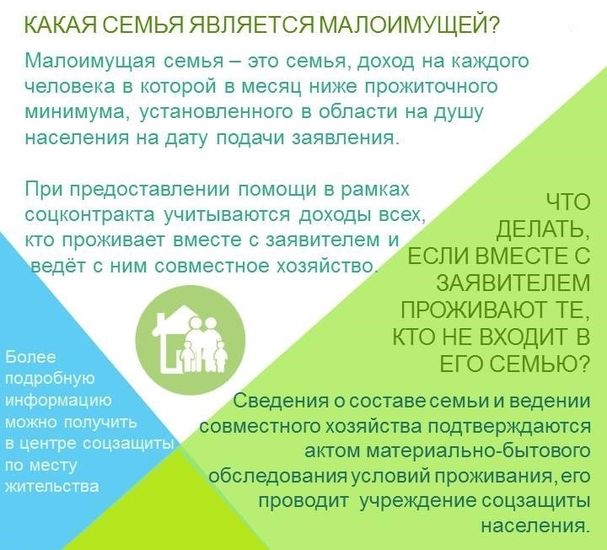
The amount of income that allows a family to be considered low-income varies by region
Other categories of citizens
Federal and regional acts may also provide benefits for other categories of the population, for example, in relation to:
- disabled people (mainly group 1 or 2);
- WWII veterans, labor veterans;
- victims of man-made or radiation disasters;
- victims of natural disasters or terrorist attacks.
People with many children were sent to build in turn - the family was left without government support and with a loan at 19%
Therefore, “The Ministry of Construction and Architecture, taking into account information from the housing policy department of the Minsk City Executive Committee, believes that there are no grounds for providing a family classified as a large family with this type of state support (in the form of a one-time subsidy - TUT.BY) for the construction of the above-mentioned residential premises.”
We recommend reading: For what period of time is consent given for a child to travel abroad?
The head of the family did not agree with this explanation and filed a lawsuit against the administration of the Frunzensky district. But the district, city, and even the Supreme Court upheld the decision of the executive committee. The Supreme Court did not accept the appeal against the decision of the district court, writing that the court justifiably refused to overturn the decision of the district administration, and “the arguments that the right to receive a subsidy arose on the basis of the general queue approach cannot be taken into account, since they are based on misunderstanding of the law."
What kind of housing is provided under a social tenancy agreement?
As part of the SN agreement, citizens are provided with residential facilities for use - houses, apartments or isolated parts of such facilities. It is prohibited to transfer to a person common house, utility or non-isolated premises, for example, passage rooms.
An important condition is compliance with the norm for the provision of living space (Article 50 of the Housing Code of the Russian Federation). This indicator is set at the level of the subject of the Federation. The standards provide for a minimum number of square meters per person. In Russia the following standards apply:
- per person - from 33 sq. m.;
- for a family of two people - from 42 sq. m.;
- for a family of three or more members - from 18 square meters per person.
These values may be increased or decreased by local officials. In this case, the reduction cannot exceed 10% of the standard value.

Important. If there is a person in the family who suffers from a serious chronic illness, they must be given a separate room. In addition, separate premises are provided to different-sex family members (with the exception of spouses), if they have not agreed to share one bedroom with each other.
What privileges does being placed on a housing waiting list provide?
What people all say is “putting on a waiting list for housing.” In official documents, this is interpreted as “registration of those in need of improved housing conditions.” Today in the city there are 29,500 people in such a queue. What does registration give? When your turn has come, you can apply for government assistance in purchasing real estate. This assistance is expressed in government support aimed at improving living conditions. For example, assistance may be expressed in the provision of a subsidy to pay part of the interest for using a loan and a subsidy to repay the principal debt on the loan (hereinafter referred to as subsidies).

The amount of this financial assistance is determined differently for different categories of citizens. The procedure and conditions for providing such state support are determined by Decree No. 240 of 07/04/2017 “On state support for citizens in the construction (reconstruction) of residential premises” (with references to Presidential Decree No. 13 of 01/06/2012). So, for example, for a large family (3 or more minor children), the amount of state subsidies will be 95% of the amount owed on the loan, and 12% (as of the refinancing rate as of today) for repayment of interest for using bank funds. For a family with 4 or more children, the subsidies will be 100%. Let's explain with an example.
A family who wants to build an apartment and whose turn has come is invited to the district administration at their place of residence and there they are offered to conclude an agreement for shared construction. The family draws up this agreement and takes out a loan from any bank. As a rule, a loan is issued at 13% for 20 years. In this case, the subsidy for repayment of the principal debt will be 95% of the principal amount of the loan, as well as 12% for repayment of interest for the use of bank funds. That is, a large family will have to pay only 1% of the interest on the loan and 5% of the total debt. Families with few children have completely different conditions.
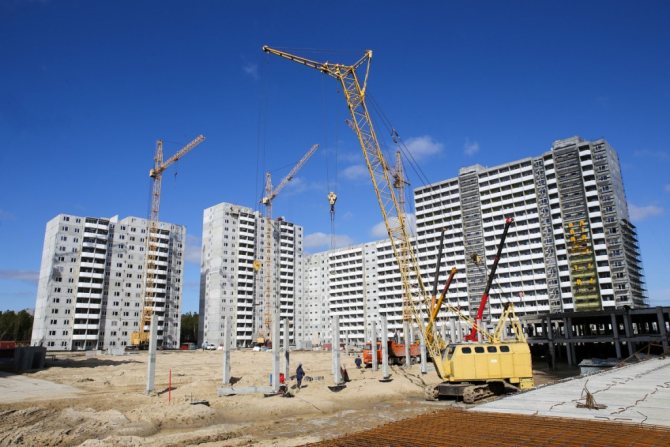
In addition to the fact that people can qualify for subsidies, registration provides other privileges. These citizens can, without waiting their turn, take out a bank loan at a lower interest rate to purchase real estate. And after a person registered for the improvement of housing conditions has taken out a loan for construction, he can draw up documents so that the 13% income tax is not partially or completely deducted from his salary. Also, the cost per square meter for shared construction for people registered as needing improved housing conditions is slightly lower.
Instructions for obtaining housing
The entire process of obtaining social housing can be divided into several stages. There are 5 main steps that separate a citizen from a new home.
Contacting the municipality
The provision of social housing does not happen automatically. In order to receive property, you need to submit an application. The housing department of the municipality is responsible for the reception and consideration of such documents. The form of the petition itself is usually determined by the administration. The form can be printed through the State Services portal or taken a sample from the MFC.
Important. The application is signed by the person who will be listed as the main employer, as well as all members of his family (spouse, minor dependents).
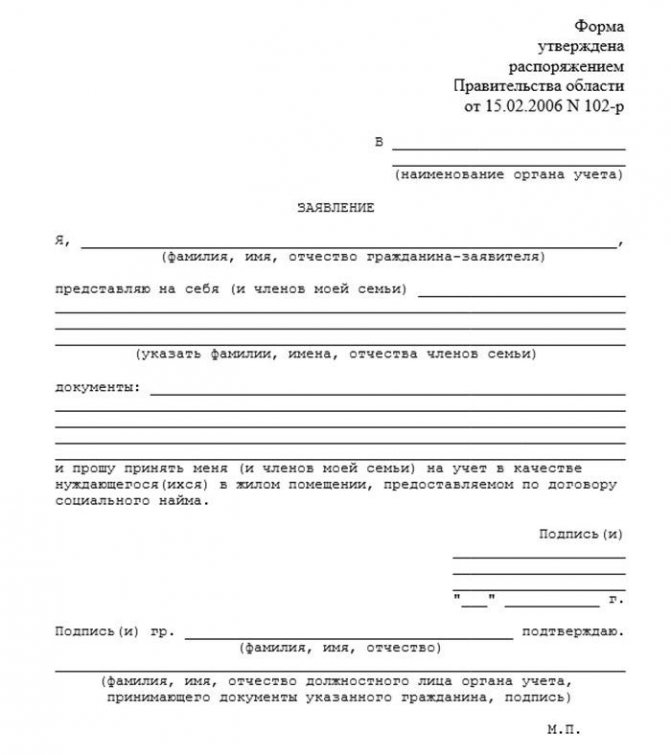
Sample form
In addition, the application is submitted along with attachments. The latter includes standard papers, such as adult passports and children’s birth certificates, marriage certificates, as well as documentation confirming the right to subsidized housing:
- medical reports;
- income certificates;
- decision to recognize the house as unsafe;
- an extract from Rosreestr about real estate registered on the right of ownership and more.
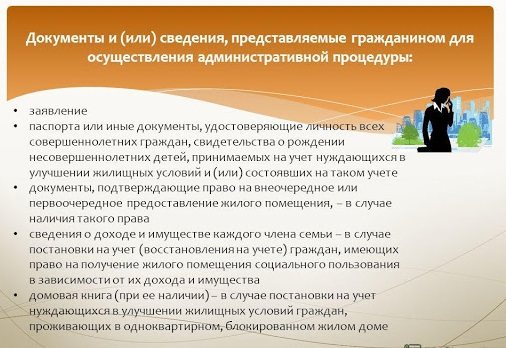
Waiting for a decision and registration
After submitting the complete package of documents, you must wait until officials consider the received application. According to Art. 12 Federal Law No. 59, the general period for preparing a response to citizens’ appeals is 30 days, but sometimes this period can be delayed if there are legal grounds, for example, it is necessary to obtain additional information.
Based on the results of studying the application, the housing committee may approve one of the following decisions:
- recognize the applicant as in need of improved living conditions and put him on the waiting list;
- refuse the application.
The refusal can be appealed in court. If the servants of Themis side with the plaintiff, officials will be obliged to compulsorily place the applicant on the waiting list.
Waiting in line and receiving a decision on housing
In practice, many citizens who have the right to municipal housing wait for the allocation of their square meters for years, or even decades. The speed of the queue depends on the capabilities of the regional treasury, government subsidies, and the number of people in need.
Important. Every 5 years, the authorities re-register persons who have already been registered. In this way, officials check whether applicants still have grounds for receiving social housing. Often the direct participation of those in need is not required, but sometimes applicants still have to independently update the package of documents.
When a suitable object appears, the person is notified accordingly. After sending such a message, the citizen needs to appear at the housing committee and receive a decision on the provision of an apartment.
Submission of necessary documents
Immediately before the allocation of living space, the recipient must re-submit current certificates and other documentation. As a rule, the applicant will have to collect the same package of documents that was submitted during the initial application.
Note. If officials discover that a person has deliberately worsened his living conditions in order to register as needy, he will be allowed to join the queue no earlier than 5 years from the date of committing dishonest acts.
Signing a social tenancy agreement and moving into housing
The final stage is the conclusion of the contract. But before signing the papers, citizens will be asked to examine the available options. If the applicants are satisfied with the new home, the agreement comes into force.
The agreement is signed by the applicant and all members of his family. A standard form for such an agreement is being developed by the Government (Article 63 of the LC). The right to use real estate under social rent should be registered with Rosreestr.
After completing the paperwork, future users will finally be able to move into their new home.
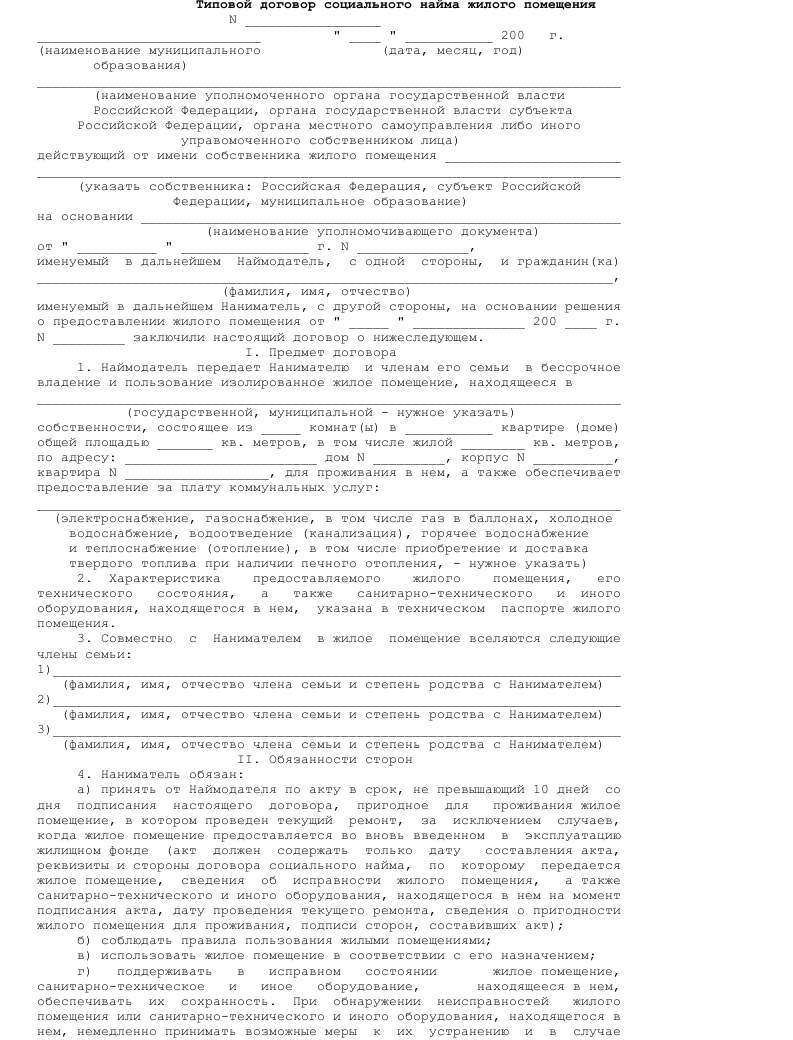
Model social rental agreement (first page)
How to get social housing in St. Petersburg
This article describes in detail how to get social housing in St. Petersburg, and everything you need to know about it. The lion's share of citizens living on the territory of the Russian Federation live in conditions that can hardly be called comfortable for living, and the financial situation of these citizens does not give them the opportunity to change anything to improve their situation. The situation is special in St. Petersburg, where, despite the political and cultural significance of this city, a huge number of dysfunctional families live. In other matters, judging by the legislative projects and government resolutions, it is clear that the state does not skimp on helping families in difficult life situations. The only let down is the low speed of construction of housing for resettlement in the presence of a huge queue of families who vitally need this housing. Therefore, in order to receive any support from the state, citizens need to have iron restraint and nerves of steel. However, at the legislative level there is the possibility of obtaining social housing for disadvantaged families. However, even yesterday’s participants in hostilities are today forced to prove their disadvantage just to get in line for housing (Article No. 238-39 of May 6, 2008, as well as Article No. 754 of December 2, 2015).
Citizens who have lived in St. Petersburg for at least 10 years or citizens without a fixed place of residence have the right to provide such housing (Article No. 281-50 of June 6, 2012).
In St. Petersburg, however, a fairly large number of citizens can apply for housing, including residents of communal apartments, participants in the Second Patriotic War, victims of the siege of Leningrad, residents who suffered from repression, in addition, low-income citizens and newlyweds. Public sector employees (doctors, teachers, kindergarten teachers, etc.) also have the right to improve their living conditions.
Thus, families whose incomes are below the subsistence level per family member have the right to purchase this type of housing, most often these are large families or families with one disabled person. Those. To get housing you must first prove that your financial condition is unfavorable.
To qualify for improved housing conditions, you must collect the necessary package of documents:
- Certificate of family composition.
- Amendment 2 Personal income tax (information on the income of working family members).
- Medical certificate (if there are family members who are unable to work, disabled people, etc.).
- Dependent family members.
- Passport or birth certificate
Assignment of low-income family status can be obtained:
- in the department of social protection department;
- at a multifunctional service center (MFC) at your place of residence;
- On the electronic portal of government services (gosuslugi.ru).
In St. Petersburg, participants in the program for the purchase of public housing include residents of communal apartments with low living conditions.
If the question concerns a communal apartment, then according to the program all residents of the communal apartment are resettled, so it is necessary to obtain the consent of all residents of the communal apartment. However, if not everyone agrees to the program, then you can submit documents the same way, just wait longer for your turn. In accordance with Law No. 407, a register is maintained for the provision of housing to low-income families.
Also, in accordance with Law No. 125 of April 17, 2007, low-income families can receive commercial housing, but in this case it is provided in accordance with the nature of the job where an able-bodied family member is placed. For living in such housing, the law firm can deduct from the employee’s income. In this case, read the rental agreement. But the procedure for providing commercial housing is also determined by the government of St. Petersburg in accordance with the current law.
In accordance with Law No. 221-32 “On the housing policy of St. Petersburg”. This law creates conditions for the provision of housing under a social tenancy agreement, i.e. According to this law, families are provided with state-owned housing. In accordance with this law, standards are established for the payment of utility bills and other financial payments. In this case, housing is provided free of charge.
To obtain such housing, you also need to contact the MFC with documents.
In St. Petersburg, one of the most beautiful cities in Russia, about 100 thousand families are on the waiting list. People have been waiting for their turn for decades, assistance programs allow people to live and raise their children. This is real courage to be able to survive in such conditions and not lose strength of spirit and psyche, not to fall in social society, because modern social orders of life are sometimes ruthless.
In this article you learned how to get social housing in St. Petersburg. If you have any questions or problems that require the participation of lawyers, then you can seek help from the specialists of the Sherlock information and legal portal. Just leave a request on our website and our lawyers will call you back.
Editor: Igor Reshetov
Rights and obligations of the parties
The conclusion of a SC agreement imposes certain obligations on both the user and the owner of the property. The main right of the landlord is to demand that payment for social rental housing be paid on time and in full. Responsibilities of the property owner:
- transfer to the tenant of the object that is the subject of the transaction;
- maintenance and repair of common property;
- ensuring major repairs and high-quality provision of utility services to residents.
Features of the employer’s implementation of his capabilities are provided for in Art. 65 LCD. The list of powers of a resident of social housing includes:
- moving into the home of third parties;
- subletting of real estate;
- admission of temporary residents to the apartment;
- home exchange;
- presenting claims to the owner regarding the quality of provision of public goods.

The list of responsibilities is also quite impressive. Bona fide employer:
- uses the premises in accordance with its intended purpose, that is, for living, and not for arranging a nail salon or computer club;
- ensures the safety of the home;
- maintains the premises in proper condition;
- engages in routine repairs of walls, ceilings, floors, and interior systems;
- pays utility bills on time and in full;
- notifies the owner of changes in facts that provide grounds for state support in the field of housing relations.
Important. Despite the fact that one person is the tenant, her family members have similar rights and obligations. In the event of the death of the tenant, the contract must be renegotiated.
Sometimes, when allocating new housing, tenants may also retain the right to use the living space they already occupy. For example, a couple and their daughter live in a communal apartment, but after the birth of their second child the family needs additional square meters. In this case, the authorities have the right to offer an additional room or allocate a separate apartment to those in need.
The Minsk City Executive Committee has a waiting list for housing for a large family
Elena Lukashevich recalled that, according to the decree, reconciliation of accounting data will be carried out annually. “I think that with the introduction of the annual reconciliation, which is carried out from February to May, those citizens who have the right to be in it will remain in the queue,” she said.
They plan to include large families, families with disabled children, people with disabilities from childhood of groups I and II, families living in unsuitable housing, military personnel and citizens living in hostels for at least ten years, as well as those on a waiting list in accordance with by law the right to priority provision of social housing.
29 Jul 2020 piterurist 172
Share this post
- Related Posts
- Divorce from a wife with a child under 3 years old
- Public cadastral map of Rosreestr
- Where are houses built with social mortgages in Kazan?
- Risks when registering a stranger
Privatization of an apartment
According to Art. 1 Federal Law No. 1541-1 privatization is a gratuitous transfer of ownership from the state or municipality to an individual.

This process takes place entirely on a voluntary basis, since it is impossible to impose owner status by law.
Citizens occupying housing under a SN agreement have the right to privatize it. In this case, the apartment will be divided in equal parts between all persons with permanent registration, including minors.
The right to privatization can be exercised only once, but this restriction does not affect subjects who participated in a similar procedure before they reached 18 years of age.
After the premises have been privatized, you can:
- sell;
- give;
- bequeath;
- exchange;
- apply for rent.
The documentary basis in this case is the privatization agreement, which is the title documentation for the property. This agreement is signed by an authorized municipal or state structure and is subject to recording in Rosreestr.
Housing for
After a sharp reduction in preferential lending, large families remained perhaps the only category of citizens who can still build housing on preferential terms. The Belarusian capital was no exception - housing for large families in Minsk continues to be an important area of work in the construction industry.
Housing for large families in Minsk will be built, despite objective difficulties in the economy, the Minsk City Executive Committee assures. This year, 400 families with three or more children will move into new apartments. In total, as of the middle of this year, 1,661 apartments for such families are being built in the Belarusian capital, their total area is 145 thousand square meters.
We recommend reading: How to Obtain a Cadastral Passport for a Garage in GSK
Early termination of a social tenancy agreement
The SN agreement is concluded for an indefinite period, however, each party reserves the right at any time to demand a change in the conditions or early termination of the agreement (Article 82-83 of the Housing Code).
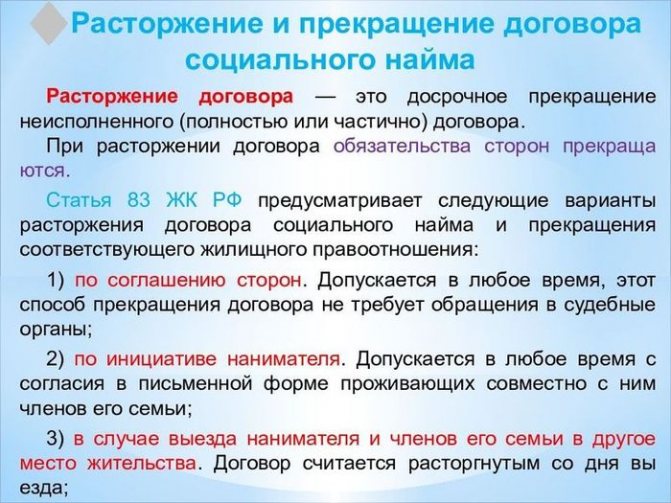
Voluntary termination of the agreement involves the expression of consent by the administration, the employer and members of his family. If the tenants have moved, then the relationship is considered canceled from the date of actual departure.
In addition, contractual obligations lose relevance:
- in case of destruction of the subject of the transaction - a mansion or apartment building;
- due to the death of a lone resident.







